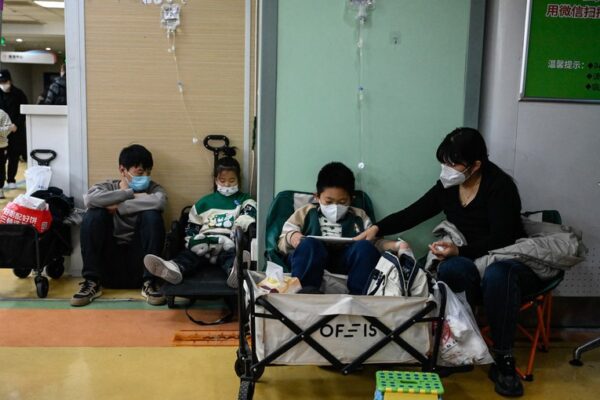Hospitals in China are being inundated with respiratory infections, particularly affecting children. While not widespread internationally, yet, there are reports of similar outbreaks as far as Ireland. But it’s not the only public health scare at the moment. COVID-19 cases are spiking again, prompting fears of a new variant emerging as China’s public health authorities, never known for their candor, have not revealed much about the wave of recent infections. Meanwhile, avian influenza (H5N1) has been spreading in 2022-2023, with the latest outbreak reported in Japan. And Indian public health officials in September worked to contain an outbreak of the deadly Nipah virus, which infected many but fortunately only caused two deaths. Is the world ready for another virus transmitted from animals to humans that spreads rapidly? Has the world learned sufficient lessons from the last pandemic and is China now more transparent? The answers to these questions are far from a resounding “yes.” Now is the time for public health officials to start putting in place more efficient information sharing, collaborative data analysis, and response plans so nations are not caught unaware like they were in 2019 with COVID-19. Human deaths from bird flu China said the surge in respiratory infections appears to be caused by a mix of bacteria and viruses. They include seasonal influenza and the bacteria-caused mycoplasma pneumoniae that in turn causes respiratory tract infections, Chinese health authorities said. No novel coronavirus has been detected, and no deaths have been reported. As for H5N1, also called bird flu and avian influenza, several Asian and Southeast Asian countries reported outbreaks in 2023. Children, many of whom apparently contracted respiratory illnesses since mid-October, receive a drip at a hospital in Beijing, Nov. 23, 2023. (Jade Gao/AFP) In Indonesia, a single H5N1outbreak led to 4,400 ducks being infected in Kalimantan alone, although there were no known cases of human transmission. In Cambodia, two people died from H5N1, the first reported human transmissions since 2014. Authorities announced a large H5N1 outbreak in poultry flock in November near the Vietnamese border. Still, no human transmissions were reported, nor was there evidence of bird flu spreading to Vietnam. Chinese officials also reported outbreaks of H5N1 in July. There were six human transmissions of another bird flu variant, H5N6, in 2023 in China. The most recent human transmission, in Chongqing, China, in September, caused one death. China has reported 88 cases of human transmission of H5N6 since 2014, with a fatality rate of 52%. Nipah rears its head The most recent outbreak in Kerala, India, of Nipah, a zoonotic virus, is thought to have been transmitted to humans from fruit bats. A zoonotic virus can spread from animals to people, and Nipah has a human fatality rate of between 40% and 75%. The virus is transmitted from excrement, saliva or urine that infects fruit, which in turn enters the human food chain, either directly or indirectly, through pigs. Human-to-human transmission is caused by respiratory droplets and bodily fluids. There is no approved vaccine, though an mRNA vaccine is being tested. To date, the rate of human-to-human transmission – (the R-Value – remember that?) – has been low. In epidemiology, the R-value is the reproductive ratio of a virus – that is, the number of people one person carrying the virus can infect. But the one thing that concerns public health officials is the long incubation period of the Nipah virus, meaning that people can infect a large number of people before they know they themselves are infected. Nipah’s symptoms are not unique – fever, cough, headache and body pains in the early stages, with delirium beginning in the final stages. Indian flying foxes or fruit bats, which transmit the Nipah virus to humans, roost in a tree near the city of Thottilpalam, in the southern state of Kerala, India, Sept. 30, 2023. (Sreekanth Sivadasn/Reuters) The Nipah virus was detected in Malaysia and Singapore in September 1998. That outbreak infected 265 people, causing 105 deaths. Back then, pigs were the host, and authorities responded with a mass cull. There have been no outbreaks in either country since 1999. In India, though, the September outbreak is the sixth one since 2001. And neighboring Bangladesh, WHO says has seen 11 separate outbreaks of Nipah from 2001-2011, which have led to the deaths of 237 people of 335 infected (71%). The Philippines had an outbreak in 2014 that was transmitted through horse meat. Governments in Southeast Asia have been conducting testing. In the Philippines, schools canceled classes briefly in Cagayan d’Oro amid fears of an outbreak. Authorities in Indonesia’s Bali stepped up monitoring at the airport. There were no signs of the disease in either country, but public health officials are clearly jumpy. Can economies take another hit? Were sufficient lessons from the COVID-19 pandemic learned and uniformly embraced to be able to deal with a large outbreak of one of these infections is the first concern. One lesson learned was that being transparent led to punishments, and the next time around countries may not be so forthcoming. For instance, countries were often punished with travel bans and other scrutiny for being open about the influx of new variants. They found there was a short-term political and economic incentive in holding back such information, although that’s exactly what should not be done. Doctors and nurses put on protective equipment before entering a quarantine facility for COVID-19 patients in Tangerang, Banten province, Indonesia, June 22, 2020. (Adek Berry/AFP) Second, after a much-needed lull, there is always a concern about complacency and societal fatigue. Could governments impose new rounds of public health lockdowns and quarantines, even at a local level, when China itself has abandoned its draconian micro-quarantining policy? Third, the national responses were inconsistent. For example, wealthy Singapore imposed very severe lockdowns, while much poorer Indonesia was highly reluctant to impose any for fear of slowing the economy. Additionally, governments across tourism-dependent Southeast Asia would have to decide whether the advantages of keeping borders open outweigh the risks…






